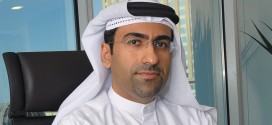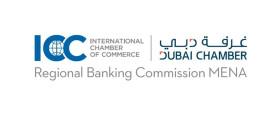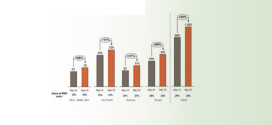 Leading names and key regulators in the international Islamic banking and finance industry took part in the 20th Anniversary Special Edition of the World Islamic Banking Conference (WIBC 2013) in Bahrain.
Leading names and key regulators in the international Islamic banking and finance industry took part in the 20th Anniversary Special Edition of the World Islamic Banking Conference (WIBC 2013) in Bahrain.
Held under the theme “Industry Transformation to Improve Global Competitiveness in Islamic Finance”, the three-day event was convened under the patronage of Prince Khalifa Bin Salman Al Khalifa, the Prime Minister of the Kingdom of Bahrain, and was supported by the Central Bank of Bahrain.
David McLean, chief executive of the World Islamic Banking Conference (WIBC), said that “the global Islamic financial services industry continues to experience double-digit growth and has achieved a recognisable position within the global financial landscape as an industry that can make significant contributions to promoting financial inclusion, and economic growth and development.
“The range of products and services offered has also widened from primarily retail banking products to more sophisticated capital market instruments catering to an increasingly global audience as a number of new jurisdictions now seek to adopt Islamic finance. As the global Islamic finance industry is transitioning to its next stage of development, it is essential that the industry further adapts to the new dynamics of global finance and transforms itself in order to achieve sustainable growth and improve its competitiveness”.
He also noted that “Asia is becoming an increasingly attractive destination for investments that are Shari’ah compliant. To reap the full benefit of the region’s rapid expansion and robust development, there is a need to press on towards achieving global connectivity and deepening economic co-operation with various key centres for Islamic finance. In order to better facilitate cross-border relationships, more intensive international co-ordination of regulatory approaches, supervisory oversight and industry practices are needed.”
And, he added, “As interest in Islamic finance expands across Asia, an increasing number of Middle Eastern investors are looking at opportunities to deploy their capital in the region and Islamic finance is perfectly positioned to act as a catalyst to further bridge capital flows between Asia and the Middle East.
“An on-going dialogue between key regulators, industry practitioners and market participants representing the two key centres for Islamic finance, ie, the Middle East and Asia, is vital to achieve greater international harmonisation in the architecture for Islamic finance.”
A similar view was expressed by Hussain AlQemzi, chief executive officer, Noor Islamic Bank and group chief executive officer, Noor Investment Group, who said that “in order to ensure an orderly evolution of Islamic finance from a niche segment into the mainstream international financial markets, it is vital to further enhance the industry’s capabilities for cross-border activities, which in turn will encourage innovative product development, robust and standardised regulatory frameworks and the long-term stability of the industry.
“What the industry lacks at the moment is the breadth and depth that investors enjoy in the conventional market. An inter-linkage between the key Islamic financial centres will facilitate investor access to a wider range of Shari’a-compliant products beyond those available in their domestic market”.
WIBC 2013 began with a pre-conference seminar hosted by the International Islamic Financial Market (IIFM). The pragmatically focused executive briefing session, led by experienced and respected industry experts, placed a range of complex themes in a practical framework, “enabling a deeper understanding of the critical issues facing the Islamic finance industry”.
Thereafter, WIBC 2013 featured a special guest address on the future of banking regulation and its implications for Islamic financial institutions by Sir Howard Davies, former chairman of the UK Financial Services Authority and former deputy governor of the Bank of England.
Commenting on the Bahrain Economic Development Board’s participation at the conference, HE Kamal bin Ahmed, Minister of Transportation and Acting Chief Executive of the Bahrain Economic Development Board, said that “for 20 years, the World Islamic Banking Conference has helped shape the global Islamic finance sector, which has experienced unprecedented growth during that time.
“This has mainly been driven by the fast-growing economies in Asia and the Middle East, but Islamic finance has also been adopted by international businesses, global sovereigns and a broad range of institutional investors, and it is events such as WIBC that have provided a platform to help expand understanding and communicate the opportunities”.
He added that “Bahrain is widely recognised as a leader in the sector, and in Islamic banking in particular, playing host to the largest concentration of Islamic financial institutions in the world, including 26 Islamic banks with total assets under management of more than $25bn. As such, the Bahrain EDB is delighted to have worked alongside WIBC for the past decade, and the Kingdom is looking forward to continuing to successfully hosting the event for many years to come.”
The conference also featured a special awards ceremony that “recognised excellence, innovation and pioneering initiatives in the global Islamic banking and finance industry looking back over the past 20 years of WIBC”.
 Cash And Trade Magazine For Cash and Trade professionals in the Middle East
Cash And Trade Magazine For Cash and Trade professionals in the Middle East





